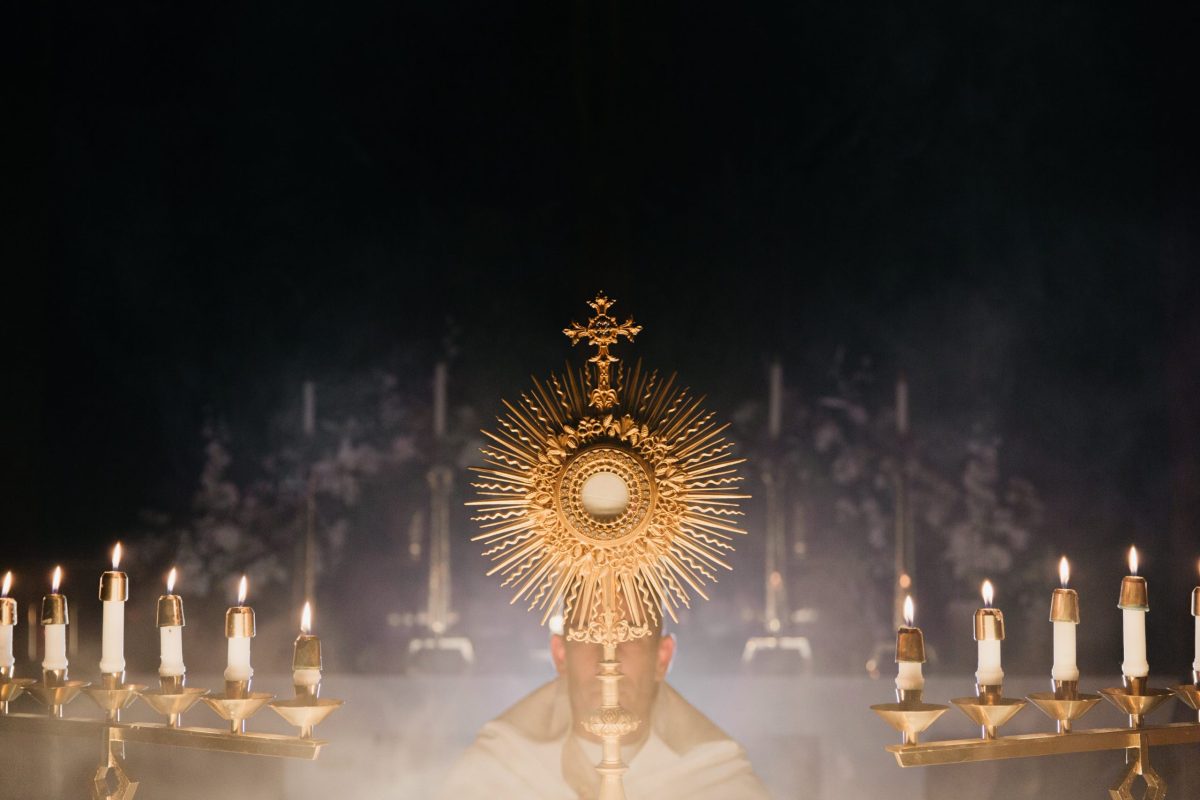By Amber Kinloch & Vir Christi
Over the past several years, I’ve encountered a number of pamphlets and articles discussing how to spend a Holy Hour. “Start small,” is a common piece of advice. “Try just 15 minutes or half an hour.” “Pray the Rosary or Divine Mercy Chaplet. Read the Bible. Bring a list of intentions to pray for.”
All of this is fine advice. What I find, though, is that these writings are essentially focused on how to fill up your time during Adoration. They don’t really help you understand how to pray during Adoration, to enter into a deeper communion with God.
Imagine if you prepared a list of topics to discuss with a friend before every meeting with them. You might cultivate some sort of relationship with them, but if you could only carry on a conversation while referring to that list of topics, your friendship won’t go very deep. The same thing happens when we get stuck on ritualistically praying a certain set of devotions during Adoration. We limit how deep we can go in our conversation with Jesus.
Vir Christi and I, both regular adorers, discussed the problem and came up with some ideas for drawing greater fruit from your time in Adoration.
Cultivate a Period of Silence
I am not always the best at beginning a Holy Hour well. Sometimes I hustle into church, drop down briefly on both my knees before the exposed Eucharist, and head to a pew, not fully comprehending or appreciating Whose Presence I’ve entered. I kneel down and my mind is full of distracting thoughts as I jump into praying the Rosary, the Divine Office, or some other formal prayer. It hardly sets me up for an intimate conversation with Jesus.
Vir Christi reminded me that it’s important to create a period of silence at the start of Adoration. He compared it to going to the gym. You don’t just run off to the gym. First, you change into exercise gear and grab your gym bag. You make sure you have water, a sweat towel, and whatever else you need. At the gym, you warm up with some stretching exercises. Only then do you hop on the treadmill for a run.
Likewise, you have to settle yourself for prayer. Arriving early and silencing your cell phone before entering church is a good first step. Next, be conscious of how you walk in. If you’re young like me and inclined to be hasty, slow your pace. You’re going to meet Jesus, not run a race!
Kneel down when you enter and stop. Don’t look around to see who else is there. Focus. Center your whole mind on Jesus, taking time to absorb that you have entered His Real Physical Presence.
Walk quietly to your pew, eyes and thoughts still focused on Him. Begin your time in Adoration listening in quiet stillness to God. There is time enough to talk with Jesus about all those things weighing on your mind. For now, just be present to your Creator.
Be Aware of Your Physical Posture
I’ve been making an effort recently to pay attention to my posture during periods of prayer. As we’ve discussed before, humans are creatures composed of body and soul. What we do with our bodies, therefore, affects our souls. If I’m slouched over in the pew, eyes half-closed, in a position comfortable enough to fall asleep, that’s hardly going to cultivate a prayerful attitude in me, is it?
To that end, I’ve been trying to kneel more during Adoration, making sure to keep my body upright. It’s the same when I sit. Likewise, I try to mind what I’m doing with my hands. Keep them still and don’t fidget—easier said than done, I know!
A friend who’s a young mom reminded me that it might be hard to do this when you have child(ren) to watch. Or there’s my mom. She likes to get up and walk back and forth along the back wall of the church, as sitting or kneeling for long periods is hard on her back. Even in these cases, though, we can still do little things like walking slowly and keeping our eyes fixed on Jesus as much as possible instead of letting them wander around the church. The point is to try to focus. It will help you cultivate a more prayerful spirit, and when you find yourself distracted to no end despite your most valiant attempts, at least you can offer Jesus your best effort physically.
Take Time to Say Goodbye
Imagine if you were visiting a friend. The time’s up for your visit and you snatch up your coat and rush out the door, not bothering to bid them farewell. It’d be beyond rude. Yet often people do this to Jesus. They get up, make a hasty genuflection, and hurry out of the church without a backwards glance.
Don’t do that. Take your time saying goodbye, perhaps with another period of silence or a certain prayer. Thank Jesus for this time you’ve had with Him. Genuflect or bow reverently at your pew and again at the door of the church before leaving. When you step outside, try not to launch right into the bustle of life. Take some time to carry that silence and peace of Adoration with you into the world. Checking your phone for texts can wait a couple of minutes.
Make a Regular Commitment if Possible
I find that people are reluctant to regularly spend time in Adoration. They will go to Adoration when they’re feeling low and talk about how wonderful it was, but they won’t make a firm commitment. They spend extra time with Jesus in the Blessed Sacrament only when they feel like it, missing out on so many graces.
There are many, perhaps, who can’t commit to a regular Holy Hour due to a tight schedule, working multiple jobs, caring for elderly parents or children, etc. If you’re among these people, I understand. There are many more, though, who could commit and don’t.
(Side note: If your parish doesn’t offer formal Adoration where the Eucharist is exposed in the monstrance, I still encourage you to go spend time before the tabernacle. Our Lord may be hidden from sight, but He is still present physically. You might also encourage your priest to offer regular Adoration if it can reasonably be done.)
It is sad at parishes where Adoration is offered frequently to see so few people taking advantage of it. Imagine if someone fell in love and thought they might marry another person. Wouldn’t it be strange, then, if they only spent time with the other person when they felt like it? It would. We expect people in love to make time to regularly see each other, even at the cost of sacrificing time that could be spent on other things they enjoy doing.
If this is so in our human relationships, how is it that people are so stingy with God? He hasn’t just given us everything. He is everything. Life has no meaning at all without Him.
Someone might object: “But I pray at home, work, etc. Why should I spend extra time in church? Isn’t God present everywhere?”
Yes, He is. But He is physically present in the Eucharist. As we all know, physical presence matters. A Zoom meeting is nothing compared to an in-person visit. So it is with Our Lord.
Jesus took on a human nature. He is truly present, Flesh and Blood (as well as Soul and Divinity) in the Eucharist. He longs not just for a spiritual union with us, but even a physical one. Simply to be in His Physical Presence, even without receiving Him in Holy Communion, imparts graces that can never be matched by a mere spiritual presence.
If we truly love Jesus and are seeking Him, we will find ourselves wanting to be with Him more and more. You don’t have to commit to an hour at a time. But if you reasonably can spend extra time with Him, why don’t you? Why not start by lingering after Sunday Mass for 10–15 minutes? Or drop in after work every day for a short visit.
God remains a Prisoner of Love in the Blessed Sacrament for our sake. He pines for us to come and keep Him company and lavishes unimaginable graces upon us in return. How can we excuse ourselves from answering His plea?

Amber Kinloch
Amber writes from the bunker of her living room. There she hunkers down with her laptop and a blanket while keeping an eye and ear tuned in to the activity of family life. Music set on loop keeps her energy flowing as she muses on the deeper happenings of ordinary life and what food to restock the fridge with.

Vir Christi
Vir’s heart has been on fire for the Church from day one, and he dreams of the day when Constantinople will be a city again. He has a competitive drive satiated by sports and board games, but is also just as happy to sit down and read a good book for hours on end.






I think the line, “God remains a Prisoner of Love in the Blessed Sacrament for our sake,” has changed the way I view adoration. Thank you.
My parish is located in a busy section of Manhattan, only a few blocks from Macy’s Department Store. Thus, it is noisy, loud, full of distractions, a challenge to sights and sounds. But the moment I enter the church and see the red flickering candle next to the gold monstrance, everything outside disappears, and only the Real Presence is there. My Holy Hour has turned into two Holy Hours, sometimes more. I am an 80-year-old retiree and I thank God for my mobility among many other blessings, but especially being with my Lord for some precious, quiet moments.
Thank-you! Sometimes we forget the magnificence of our creator. I want to forever search-for/stir-up/and share that with others. God bless all!
Humility of Heart is good to read at Adoration. Read Humility Of Heart by Rev. Fr. Cajetan da Bergamo. Also Map of Life by Frank Sheed is apt. To Know Christ Jesus by Frank Sheed is also a good choice during adoration.
How few Catholics expect, as I was taught and found to be true, that God is present and awaits only our vulnerability to communion with Him in Eucharistic adoration. The reality is that in this act we take up exactly the same place and disposition toward God that will occur in the absolute perfection of our entry before God in Heaven. What we have yet to discover, as became known to multitudes of saints before us, is that those who take up their sainthood in attendant adoration of God take up communion with Him. Those who enter into that communion with him will soon realize they have already begun participation in their sainthood and destiny of Heaven. The communion with God that soon becomes established certifies irrevocably in their heart that this has occurred. The personal vision of God, indescribable employing mere words, begins to define every response of ours to Him. Without question, the most magnificent times in prayer I have known have been when I brought with me no prayer at all. In fact the manner in which I came was destitute. I brought nothing but the determination to attend God alone without other expectation or qualification. God is never distant and for those who will attend Him patiently for His sake alone; who reject bringing before Him even a “spiritual” agenda. He is easily recognized and and easily known for those who come empty. In this manner, without even a word, Gods wishes become known without our asking as a result of our simple and silent attendance. That is why this sort of prayer is called contemplation. In order to enter into the contemplation of God necessary for communion with Him, we must first determine to become available to Him in a manner wholly unqualified. In doing so our vulnerability to Him soon becomes consummate. Once that silent, patient, and attentive disposition of contemplation occurs, a magnificent knowledge of God will soon follow. Many in our church have concluded that contemplation of God is a type of prayer when in fact contemplation of God is the indispensable heart of all genuine prayer. It must become recognized that all true prayer in its essence is contemplative. The Unfathomable God is fully aware that we cannot contemplate the God we do not yet know. He intended always to be fully known by us from the time of our creation. Our becoming attendant, expectant, and available without qualification to God in response to His incessant unqualified availability to us enables a torrent of His graciousness that words cannot describe for those who embrace these dispositions. What has failed us and our Church from it lowest places to its highest is the trading of our expectation of the immediate and incessant presence of God for self concern. How few of us are consistently concerned in our prayer with attendance to the needs of God, and God alone, as is our true destiny in His creation. Determine to take up with patience and expectation exactly the place in Heaven of attendant communion with God in which you will become a participant upon entry there. You will soon find yourself, instead of grasping in uncertainty for that “right” prayer, to be bound in a communion of rapt attention to Him to the exclusion of any other concern. It is ours to discover the insatiable need of our God for imparting His attention to us as we choose availability only to Him. God alone.
Wonderful. Thanks
Thank you! I am a teacher of junior high students and always on the lookout for ways to help my young students “get into” Adoration! Well done!❤️
God‘s graces in adoration is absolutely life changing in my relationship with Jesus Christ. I look forward to it every day and when I miss a day how I long for my next visit.
Great article. Inspiring. Will help me during my regular Adoration visit. I will be forwarding it. Thank you
Hi Folks
My adoration hour was in the very early morning.
I thought the quiet and well I am not doing anything else would be great.
All I did was fight sleep.
Go when you could be doing something else you will be alive and vibrant .
I had a priest advise me once about falling asleep during adoration. He stated, “God must know you need the rest.”
From my point of view, it may be helpful to remember that many saints were visited by Jesus or angels in dreams (and try not to hit your head on the pew in front of you).
I am not Catholic, but I love this piece. I agree with these sentiments of spending time in intimacy with the Lord in complete reverence and being mindfully present. It is easier said than done, but it’s important to Him.
Thank you for these tips. Reminds me of one of my favorite hymns: “Be Still and know that I am God!”
Thank you for the reminders as well as thoughts needed to make time with Jesus what it should be…a special time to truly connect.
Beautiful.
Thank you for your suggestion about walking during adoration. Some of us can’t genuflect or kneel, for a variety of reasons, and coming up with another solution was helpful. I really miss kneeling, but, alas, it is no longer an option. We are blessed with 24/7 Adoration.
When I saw this on my phone I thought “Oh, this sounds stuffy”? But I read it and was so common sense down to earth sensible and inspirational, I can only say thank you for a great article, one I will try to keep with me.